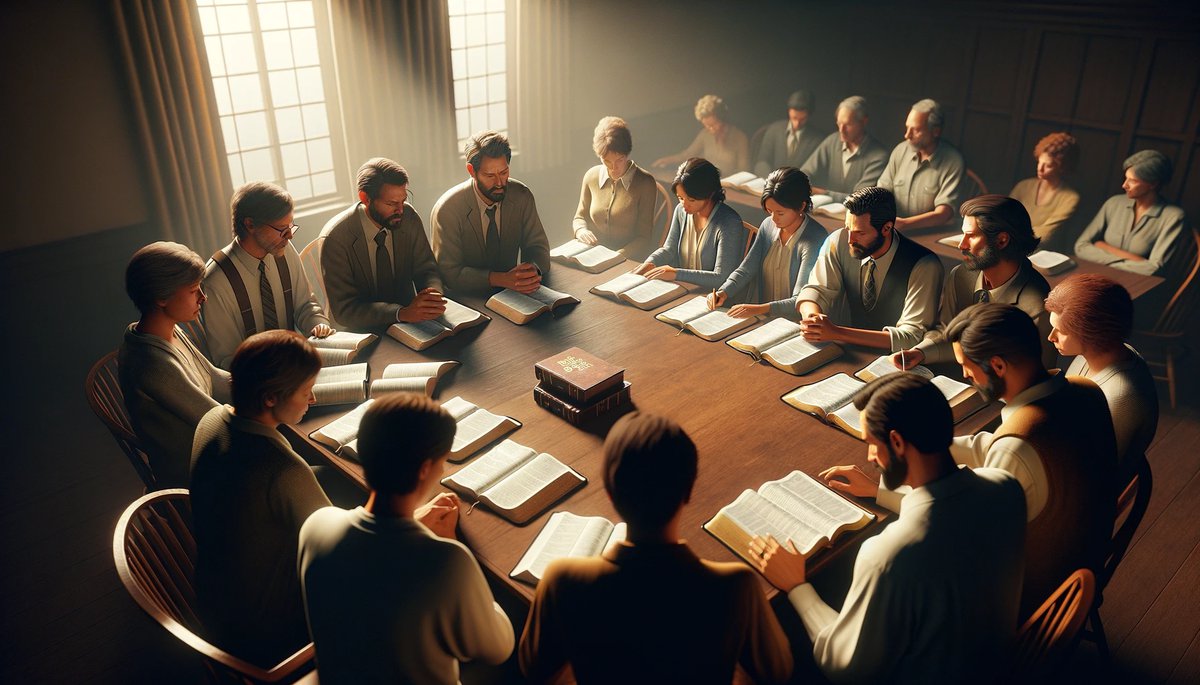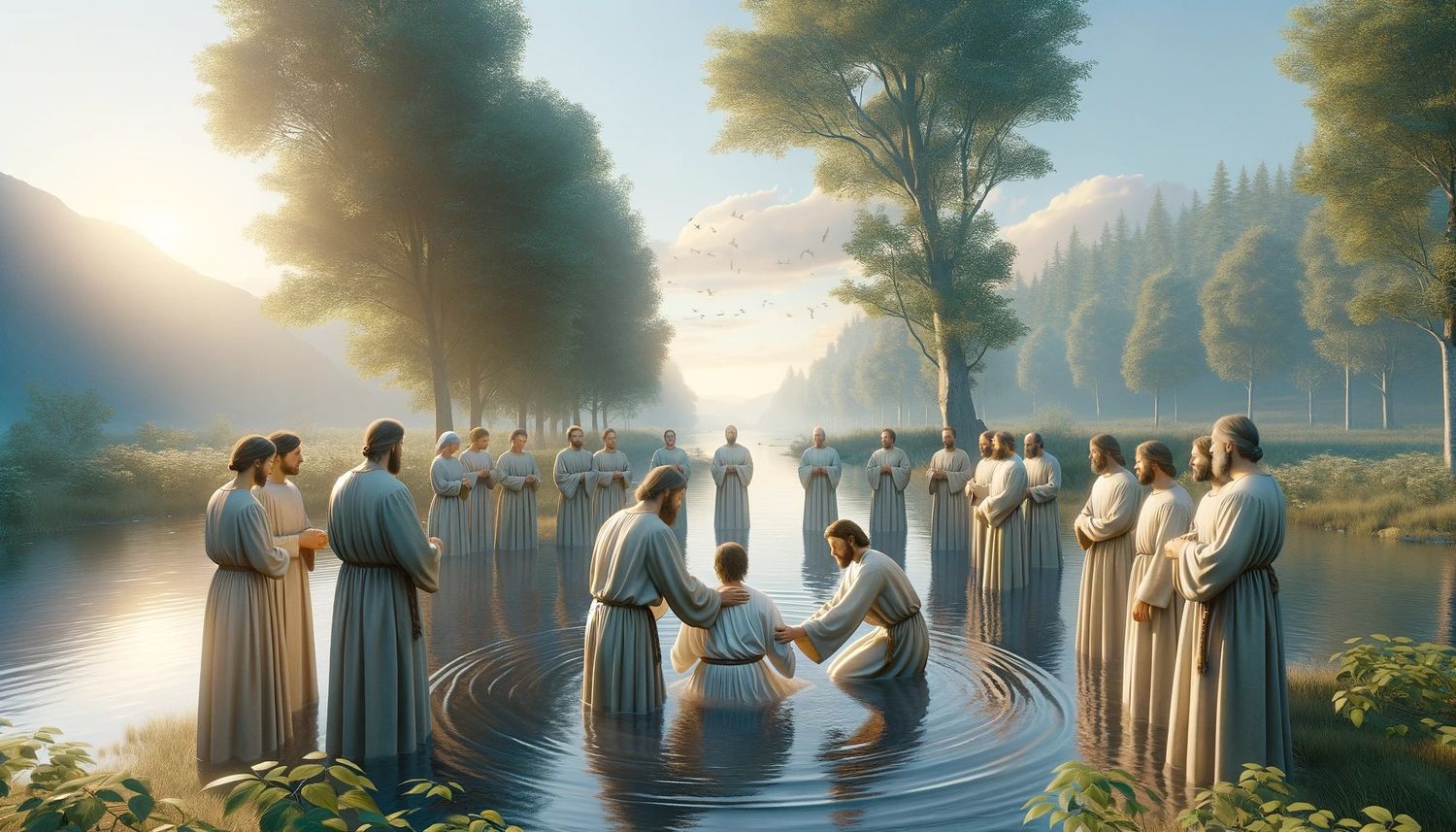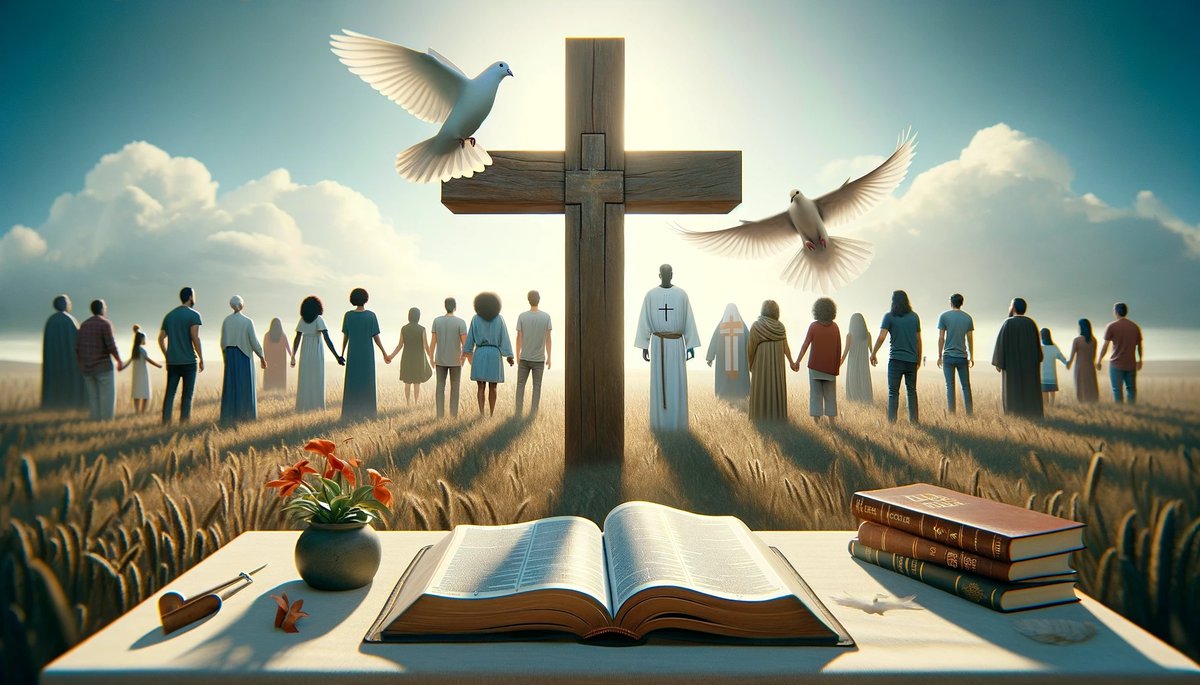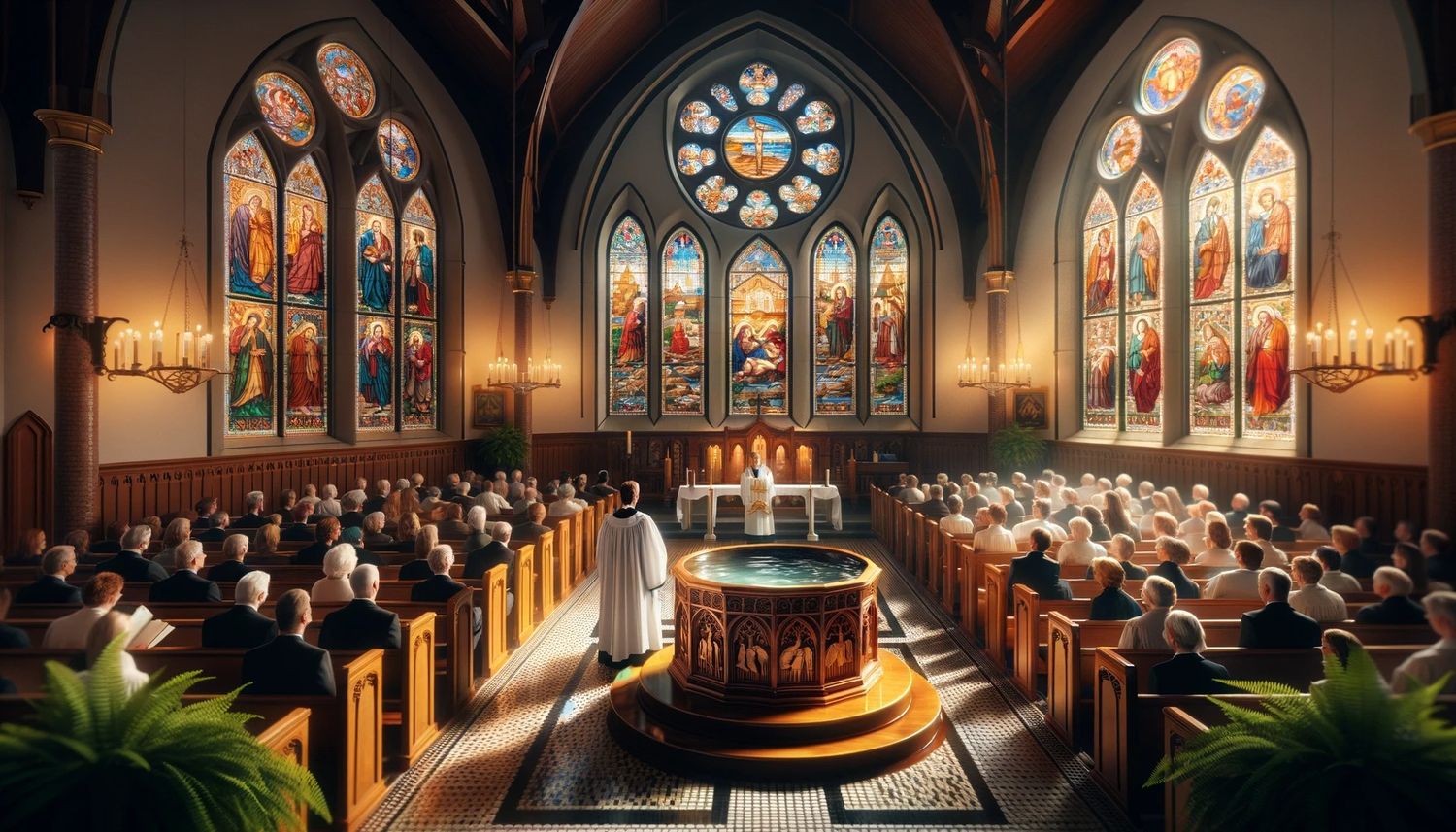Home>Theology and Spirituality>What Do Baptist Briders Believe


Theology and Spirituality
What Do Baptist Briders Believe
Published: February 20, 2024
Jason DeRose, Managing Editor at Christian.net, uses his expertise in religion and journalism to deepen understanding of faith's societal impacts. His editorial leadership, coupled with a strong academic background, enriches the platform’s diverse content, earning him recognition in both journalism and religious circles.
Discover the beliefs of Baptist Briders and their theology and spirituality. Explore their unique perspectives on faith and doctrine.
(Many of the links in this article redirect to a specific reviewed product. Your purchase of these products through affiliate links helps to generate commission for Christian.net, at no extra cost. Learn more)
Table of Contents
Introduction
Baptist Briders, also known as Landmark Baptists, are a distinctive group within the broader Baptist tradition. Their beliefs and practices are rooted in a deep commitment to historical continuity and a particular understanding of the church's nature and authority. Understanding the Baptist Briders' perspective requires delving into their historical development, core beliefs, and unique theological positions.
The Baptist Briders' theological framework is characterized by a strong emphasis on the perpetuity of the local church and the preservation of apostolic succession. This perspective shapes their understanding of the church's role in preserving and perpetuating true Christian doctrine and practice. Additionally, their views on salvation, baptism, and ecclesiology are informed by this foundational commitment to historical continuity.
Exploring the history and beliefs of Baptist Briders provides valuable insights into the diversity and richness of the Baptist tradition. It also offers an opportunity to engage with the theological nuances that have shaped their distinct identity within the broader landscape of Christian faith traditions. As we delve into the historical roots and doctrinal distinctives of Baptist Briders, we gain a deeper appreciation for the complexities and diversity within the Baptist family of churches.
Read more: What Do Baptist Believe
History of Baptist Briders
The history of Baptist Briders can be traced back to the 19th century, a period marked by significant theological and ecclesiastical developments within the Baptist tradition. The emergence of Landmarkism, a movement advocating for a strict interpretation of Baptist successionism, played a pivotal role in shaping the distinct identity of Baptist Briders.
Landmarkism, championed by prominent figures such as James Robinson Graves and J.R. Pendleton, sought to reaffirm the historical continuity and perpetuity of the local church. This movement emphasized the belief that true church succession could be traced back to the apostolic era, and that genuine Christian ordinances, including baptism, were preserved within Baptist congregations throughout history.
The Landmarkist perspective gained traction within certain Baptist circles, leading to the formation of Landmark Baptist churches and associations. These congregations adhered to a strict interpretation of Baptist successionism, rejecting the validity of ordinances administered outside the Landmark Baptist tradition. This exclusivist stance reflected the Landmarkists' commitment to preserving what they viewed as the unbroken lineage of true New Testament churches.
The Landmarkist movement also sparked theological controversies and debates within the broader Baptist community, as its proponents advocated for a reevaluation of Baptist history and ecclesiology. While Landmarkism did not gain universal acceptance among Baptists, it significantly influenced the development of Baptist Briders as a distinct subgroup within the Baptist tradition.
In the ensuing years, Baptist Briders continued to uphold the foundational tenets of Landmarkism, emphasizing the perpetuity of the local church and the preservation of apostolic practices. This historical trajectory underscores the enduring impact of Landmarkism on the formation and theological orientation of Baptist Briders, shaping their distinctive beliefs and ecclesiological convictions.
The historical evolution of Baptist Briders reflects a commitment to preserving a particular understanding of Baptist identity and ecclesiological continuity. By tracing their historical roots, we gain valuable insights into the theological and historical factors that have contributed to the unique identity of Baptist Briders within the broader landscape of Baptist denominations.
Core Beliefs of Baptist Briders
Baptist Briders hold a set of core beliefs that distinguish them within the broader Baptist tradition. These beliefs are deeply rooted in their commitment to historical continuity and a particular understanding of the nature and authority of the church. Understanding the core beliefs of Baptist Briders provides valuable insights into their theological framework and doctrinal distinctives.
-
Perpetuity of the Local Church: Central to the beliefs of Baptist Briders is the conviction that the true New Testament church has continued in an unbroken succession from the time of the apostles to the present day. They emphasize that genuine Christian congregations have persisted throughout history, preserving the essential doctrines and practices of the early church. This belief in the perpetuity of the local church shapes their ecclesiology and underscores the significance they attribute to the historical continuity of authentic Christian assemblies.
-
Apostolic Succession: Baptist Briders affirm the concept of apostolic succession, asserting that the authority and validity of the local church and its ordinances can be traced back to the apostolic era. They maintain that the true church has maintained its identity and practices in an unbroken line of succession, distinct from other Christian traditions. This emphasis on apostolic succession reflects their commitment to preserving the integrity of the church's origins and practices.
-
Baptist Identity: Baptist Briders strongly identify with the historical Baptist movement, emphasizing the distinctives of Baptist theology and ecclesiology. They uphold traditional Baptist principles, including believer's baptism by immersion, congregational polity, and the autonomy of the local church. This commitment to Baptist identity is integral to their core beliefs and serves as a defining feature of their theological perspective.
-
Ecclesiological Exclusivism: Baptist Briders maintain an exclusivist stance regarding the recognition of valid ordinances and church authority. They assert that only churches adhering to their understanding of apostolic succession and historical continuity possess the authority to administer valid ordinances, such as baptism and the Lord's Supper. This exclusivist position reflects their unwavering commitment to preserving what they perceive as the genuine apostolic lineage of the church.
-
Preservation of Truth: Central to the core beliefs of Baptist Briders is the conviction that the true Christian faith and its practices have been preserved within the historical trajectory of the Baptist movement. They emphasize the continuity of essential Christian truths and ordinances within the context of Baptist congregations, viewing this preservation as a foundational aspect of their theological identity.
These core beliefs collectively form the theological framework that distinguishes Baptist Briders within the broader Baptist tradition. Their unwavering commitment to historical continuity, apostolic succession, and Baptist distinctives shapes their ecclesiological convictions and theological outlook, underscoring the unique identity of Baptist Briders within the landscape of Christian faith traditions.
Differences Between Baptist Briders and Other Baptist Groups
Baptist Briders, also known as Landmark Baptists, exhibit distinct theological and ecclesiological differences when compared to other Baptist groups. These differences stem from their unique emphasis on historical continuity, apostolic succession, and the exclusive recognition of certain church practices. Understanding these disparities provides valuable insights into the diverse theological landscape within the broader Baptist tradition.
One significant point of contrast lies in the Baptist Briders' strict adherence to the perpetuity of the local church. Unlike other Baptist groups, Baptist Briders assert that the true New Testament church has persisted in an unbroken succession from the apostolic era to the present day. This emphasis on historical continuity sets them apart, as they prioritize the preservation of apostolic practices within their congregations.
Additionally, the concept of apostolic succession forms a foundational point of divergence between Baptist Briders and other Baptist denominations. While some Baptist groups may acknowledge historical continuity, Baptist Briders maintain a distinct emphasis on tracing the authority and validity of the local church and its ordinances back to the apostolic era. This unique perspective shapes their ecclesiological convictions and sets them apart within the Baptist landscape.
Another notable difference lies in the exclusivist stance maintained by Baptist Briders regarding the recognition of valid ordinances and church authority. Unlike many other Baptist groups, Baptist Briders assert that only churches adhering to their understanding of apostolic succession and historical continuity possess the authority to administer valid ordinances, such as baptism and the Lord's Supper. This exclusivist position reflects their unwavering commitment to preserving what they perceive as the genuine apostolic lineage of the church.
Furthermore, Baptist Briders' strong identification with traditional Baptist principles, including believer's baptism by immersion, congregational polity, and the autonomy of the local church, distinguishes them from other Baptist groups. Their unwavering commitment to these distinctives underscores their theological and ecclesiological differences within the broader Baptist tradition.
These differences collectively highlight the unique theological and ecclesiological perspectives of Baptist Briders, underscoring the diversity and richness present within the broader landscape of Baptist denominations. By recognizing these disparities, we gain a deeper appreciation for the theological nuances that contribute to the distinct identity of Baptist Briders within the tapestry of Christian faith traditions.
Baptist Briders' Views on Salvation
Baptist Briders' views on salvation are deeply intertwined with their theological framework, emphasizing the perpetuity of the local church and the preservation of apostolic practices. Central to their understanding of salvation is the conviction that the true Christian faith has been preserved within the historical trajectory of the Baptist movement.
From a Baptist Briders' perspective, salvation is rooted in the atoning work of Jesus Christ and is appropriated through faith in Him. They affirm the traditional Baptist belief in salvation by grace through faith, emphasizing the necessity of personal repentance and faith in Christ as the sole means of receiving salvation. This aligns with the broader Baptist tradition's emphasis on individual conversion and the personal nature of salvation.
Furthermore, Baptist Briders emphasize the role of the local church in the administration of ordinances, particularly baptism, as an outward expression of one's inward faith. They uphold the practice of believer's baptism by immersion, viewing it as a scriptural mandate and an essential component of the believer's obedience to Christ. This distinctive emphasis on baptism reflects their commitment to preserving apostolic practices within the context of the local church.
In the Baptist Briders' theological framework, the local church serves as the custodian of true Christian doctrine and the vehicle through which the ordinances of baptism and the Lord's Supper are administered. This ecclesiological perspective shapes their views on salvation, underscoring the significance they attribute to the role of the church in facilitating the believer's spiritual journey.
Moreover, Baptist Briders maintain a strong commitment to the autonomy of the local church, viewing it as the primary locus for nurturing and shepherding believers in their faith. This emphasis on the local church's role in the believer's spiritual formation and growth underscores their conviction that salvation is intricately linked to active participation in the life of the church.
Overall, Baptist Briders' views on salvation reflect their deep-seated commitment to historical continuity, apostolic succession, and the preservation of true Christian practices within the context of the local church. Their theological perspective underscores the integral role of the church in facilitating the believer's journey of faith and obedience, shaping their distinct views on salvation within the broader landscape of Baptist theology.
Read more: What Do Spiritual Baptist Believe
Baptist Briders' Views on Baptism
Baptist Briders' views on baptism are deeply rooted in their theological framework, which emphasizes the perpetuity of the local church and the preservation of apostolic practices. Central to their understanding of baptism is the conviction that it is a scriptural ordinance to be administered within the context of the true New Testament church.
From the Baptist Briders' perspective, baptism holds significant theological and ecclesiological importance. They adhere to the practice of believer's baptism by immersion, viewing it as a symbolic representation of the believer's identification with Christ's death, burial, and resurrection. This emphasis on immersion as the mode of baptism aligns with their commitment to preserving apostolic practices and reflects their understanding of baptism's scriptural mandate.
Furthermore, Baptist Briders emphasize the role of the local church as the authorized entity for administering baptism. They assert that only churches adhering to their understanding of apostolic succession and historical continuity possess the authority to validly administer baptism. This exclusivist stance underscores their unwavering commitment to preserving what they perceive as the genuine apostolic lineage of the church and its ordinances.
In the Baptist Briders' theological framework, baptism serves as a public declaration of one's faith and commitment to Christ, marking the individual's entrance into the fellowship of the local church. They view baptism as an essential step of obedience for believers, symbolizing their identification with the body of Christ and their participation in the life of the church.
Moreover, Baptist Briders maintain that baptism is a prerequisite for partaking in the Lord's Supper, underscoring its significance as a foundational ordinance within the life of the local church. This ecclesiological perspective shapes their views on baptism, highlighting the integral role of the church in administering and safeguarding this sacred rite.
Overall, Baptist Briders' views on baptism reflect their deep-seated commitment to historical continuity, apostolic succession, and the preservation of true Christian practices within the context of the local church. Their theological perspective underscores the significance they attribute to baptism as a scriptural ordinance and its role in shaping the identity and fellowship of believers within the broader landscape of Baptist theology.
Baptist Briders' Views on the Church
Baptist Briders' views on the church are deeply intertwined with their theological framework, emphasizing the perpetuity of the local church and the preservation of apostolic practices. Central to their understanding of the church is the conviction that the true New Testament church has continued in an unbroken succession from the time of the apostles to the present day. This foundational belief shapes their ecclesiological convictions and underscores the significance they attribute to the historical continuity of authentic Christian assemblies.
From the Baptist Briders' perspective, the local church holds a central and indispensable role in the life of the believer and the broader Christian community. They emphasize the autonomy of the local church, viewing it as the primary locus for nurturing and shepherding believers in their faith. This emphasis on the autonomy of the local church reflects their conviction that each congregation has the authority to govern its own affairs and make decisions in accordance with scriptural principles.
Furthermore, Baptist Briders maintain that the local church serves as the custodian of true Christian doctrine and the vehicle through which the ordinances of baptism and the Lord's Supper are administered. They assert that only churches adhering to their understanding of apostolic succession and historical continuity possess the authority to validly administer these ordinances. This exclusivist stance underscores their unwavering commitment to preserving what they perceive as the genuine apostolic lineage of the church and its practices.
In the Baptist Briders' theological framework, the local church is viewed as the visible expression of the body of Christ, embodying the spiritual fellowship and collective worship of believers. They emphasize the importance of congregational polity, wherein each local assembly is autonomous and self-governing, free from external ecclesiastical control. This emphasis on congregational polity reflects their commitment to preserving the integrity and independence of the local church as a distinct entity within the broader Christian community.
Moreover, Baptist Briders' views on the church underscore the significance they attribute to the role of the church in facilitating the believer's spiritual journey. They view the local church as the primary context for spiritual growth, mutual edification, and the exercise of spiritual gifts within the body of believers. This ecclesiological perspective shapes their understanding of the church as a dynamic and vibrant community of faith, actively engaged in fulfilling the Great Commission and advancing the kingdom of God.
Overall, Baptist Briders' views on the church reflect their deep-seated commitment to historical continuity, apostolic succession, and the preservation of true Christian practices within the context of the local church. Their theological perspective underscores the integral role of the church in nurturing believers, administering ordinances, and embodying the spiritual fellowship of the body of Christ within the broader landscape of Baptist theology.
Conclusion
In conclusion, the exploration of Baptist Briders' historical development, core beliefs, and theological perspectives offers valuable insights into the diverse and rich tapestry of the Baptist tradition. The distinctive identity of Baptist Briders, characterized by their unwavering commitment to historical continuity, apostolic succession, and the exclusive recognition of certain church practices, underscores the theological nuances that contribute to the diversity within the broader Baptist family of churches.
The historical trajectory of Baptist Briders, rooted in the 19th-century Landmarkist movement, reflects a deep-seated commitment to preserving a particular understanding of Baptist identity and ecclesiological continuity. This commitment has shaped their distinct theological framework, emphasizing the perpetuity of the local church and the preservation of apostolic practices as essential components of their doctrinal distinctives.
Furthermore, the core beliefs of Baptist Briders, including their emphasis on the perpetuity of the local church, apostolic succession, Baptist identity, ecclesiological exclusivism, and the preservation of truth, collectively form the theological foundation that sets them apart within the broader Baptist tradition. These core beliefs underscore their unwavering commitment to preserving what they perceive as the genuine apostolic lineage of the church and its practices, shaping their ecclesiological convictions and theological outlook.
The differences between Baptist Briders and other Baptist groups, particularly in their strict adherence to historical continuity, apostolic succession, and the exclusive recognition of certain church practices, highlight the theological diversity present within the Baptist tradition. These disparities provide valuable insights into the theological nuances that contribute to the distinct identity of Baptist Briders within the broader landscape of Christian faith traditions.
Moreover, Baptist Briders' views on salvation, baptism, and the church reflect their deep-seated commitment to historical continuity, apostolic succession, and the preservation of true Christian practices within the context of the local church. Their theological perspective underscores the integral role of the church in nurturing believers, administering ordinances, and embodying the spiritual fellowship of the body of Christ within the broader landscape of Baptist theology.
In essence, the exploration of Baptist Briders' history, core beliefs, and theological perspectives enriches our understanding of the complexities and diversity within the Baptist tradition. It invites us to appreciate the theological nuances that have shaped the distinct identity of Baptist Briders and underscores the richness of the broader Baptist family of churches.














